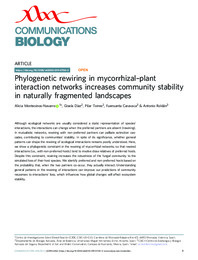Please use this identifier to cite or link to this item:
https://hdl.handle.net/11000/34872Full metadata record
| DC Field | Value | Language |
|---|---|---|
| dc.contributor.author | Díaz Espejo, Gisela | - |
| dc.contributor.author | Montesinos Navarro, Alicia | - |
| dc.contributor.author | Torres, Pilar | - |
| dc.contributor.author | Caravaca, Fuensanta | - |
| dc.contributor.author | Roldán, Antonio | - |
| dc.contributor.other | Departamentos de la UMH::Biología Aplicada | es_ES |
| dc.date.accessioned | 2025-01-18T08:17:35Z | - |
| dc.date.available | 2025-01-18T08:17:35Z | - |
| dc.date.created | 2019 | - |
| dc.identifier.citation | Communications Biology | es_ES |
| dc.identifier.isbn | 2399-3642 | - |
| dc.identifier.uri | https://hdl.handle.net/11000/34872 | - |
| dc.description.abstract | Although ecological networks are usually considered a static representation of species’ interactions, the interactions can change when the preferred partners are absent (rewiring). In mutualistic networks, rewiring with non-preferred partners can palliate extinction cascades, contributing to communities’ stability. In spite of its significance, whether general patterns can shape the rewiring of ecological interactions remains poorly understood. Here, we show a phylogenetic constraint in the rewiring of mycorrhizal networks, so that rewired interactions (i.e., with non-preferred hosts) tend to involve close relatives of preferred hosts. Despite this constraint, rewiring increases the robustness of the fungal community to the simulated loss of their host species. We identify preferred and non-preferred hosts based on the probability that, when the two partners co-occur, they actually interact. Understanding general patterns in the rewiring of interactions can improve our predictions of community responses to interactions’ loss, which influences how global changes will affect ecosystem stability. | es_ES |
| dc.format | application/pdf | es_ES |
| dc.format.extent | 8 | es_ES |
| dc.language.iso | eng | es_ES |
| dc.publisher | Springer Nature | es_ES |
| dc.relation.ispartofseries | 2 | es_ES |
| dc.rights | info:eu-repo/semantics/openAccess | es_ES |
| dc.rights | Attribution-NonCommercial-NoDerivatives 4.0 Internacional | * |
| dc.rights.uri | http://creativecommons.org/licenses/by-nc-nd/4.0/ | * |
| dc.subject.other | CDU::5 - Ciencias puras y naturales::58 - Botánica | es_ES |
| dc.title | Phylogenetic rewiring in mycorrhizal–plant interaction networks increases community stability in naturally fragmented landscapes | es_ES |
| dc.type | info:eu-repo/semantics/article | es_ES |
| dc.relation.publisherversion | https://doi.org/10.1038/s42003-019-0700-3 | es_ES |

View/Open:
58-Phylogenetic_rewiring_completo.pdf
784,75 kB
Adobe PDF
Share:
.png)
